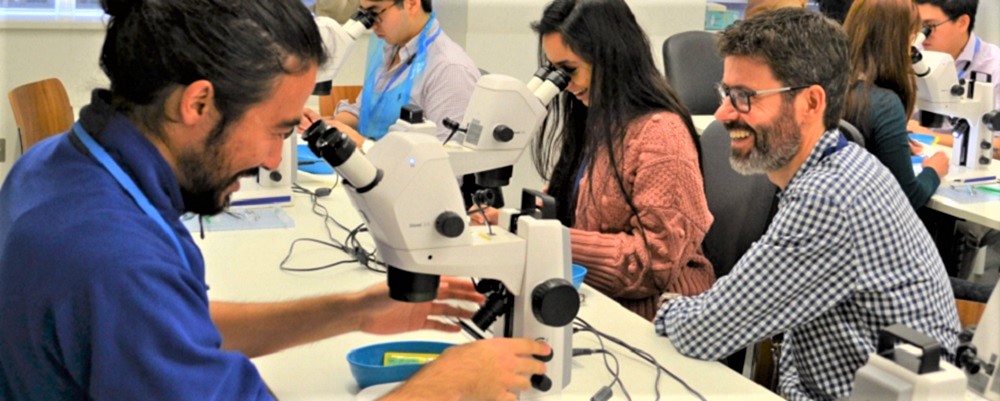This career pathway involves trainees taking up posts that enable them to integrate research into their clinical training, with the ambition of becoming a clinical academic employed primarily by a university or the NHS.
The academic experience can be highly valuable, providing knowledge and experience that facilitates future engagement in research and education, while delivering a skillset that is hugely beneficial for clinical work.
Engage in research at every stage of your training
The Royal College of Paediatrics and Child Health and the Royal College of Physicians Research Engagement Toolkit provide excellent overviews of academic training and more broadly how, as a doctor, you can engage in research. It is important to highlight that the path to academia is flexible, and you can enter and exit the academic training pathway at any stage of your career.
Academic training pathway diagram
Interest in research can start early on in medical school through research electives, student selected modules or undertaking intercalated degrees in biomedical sciences (BSc), or MB/PHD programmes.
The Specialised Foundation Programme (previously called the Academic Foundation Programme, AFP) provides an opportunity for newly qualified doctors to spend up to 4 months in academia.
Academic Training in in England
The NIHR Integrated Academic Training Programme provides a flexible pathway for combining clinical and academic/educational training. This is part of a comprehensive set of training programmes offered by the NIHR.
Academic Clinical Fellowships (ACFs)
ACFs are 3-year posts that allow specialty trainees to spend 25% of their time developing research or educational skills and preparing for a PhD fellowship application. Typically the entry point into ACF posts is at ST1-3 level.
Recruitment to these posts is on an annual basis and is coordinated with national specialty training in ophthalmology. For additional information see the NIHR website.
PhD Studies
ACFs will be expected to apply for a clinical research training fellowship to undertake a higher degree, such as a PhD. Funders of these fellowships include the NIHR, UKRI MRC, Wellcome Trust and other eye-related charities. In addition, universities advertise PhD studentships that are funded through awards directly to the institutions e.g. 4Ward North Clinical PhD Academy and Clinical Academic Training at UCL.
Whilst undertaking the PhD, trainees go Out of Programme (OOP), typically for 3 years. Look at the Out-of-Programme-Research-FAQs.
Academic Clinical Lectureships (ACLs)
ACLs provide an opportunity for trainees to continue with their research after obtaining a PhD. In these posts, which can last for up to 4 years, trainees spend 50% of their time doing research, whilst at the same time completing their clinical training. In these early post-doctoral positions, clinical lecturer starter grants can be applied for from The Academy of Medical Sciences and Fight for Sight, amongst others. These grants provide non-salary support to help aspiring academics run their research and begin to establish themselves as independent researchers.
Balancing clinical and surgical training with research demands in a craft specialty can be challenging for ophthalmology trainees, therefore, the Royal College of Ophthalmologist is committed to supporting you in your academic training and have set out key recommendations in the Advancing Academic Ophthalmology document.
Clinician Scientist/Intermediate Fellowships
The next step in transitioning to independence (ie leading your own ambitious research plan and establishing your own research team) is applying for clinician scientist/intermediate fellowships. These Fellowships provide funding support for full personal salary costs, along with support for research staff, research consumables and equipment for the research project.
These are available from funding bodies including the NIHR, the UKRI–MRC, the Wellcome Trust and the Academy of Medical Sciences. They are typically awarded to post-doctoral trainees nearing completion of training or at consultant level and provide a stepping stone towards senior research fellowships and university academic posts.
Academic training in Scotland
The Scottish Clinical Research Excellence Development Scheme (SCREDS) provide academic training opportunities at clinical lecturer level, with opportunities to undertake OOPR and advanced academic career development. Various universities support and mentor clinicians towards competitive PhD funding applications, whilst others run fully funded PhD schemes that can be applied for by trainees outwith of Scotland.
Academic training in Northern Ireland
Trainees in Northern Ireland can apply for ACFs and ACLs, for further information see the Northern Ireland Medical and Dental Training Agency website.
Academic training in Wales
The Welsh Clinical Academic Track Fellowship Programme provides run-through clinical fellowship training positions.
Advancing academic ophthalmology
This document sets out the current status of academic ophthalmology in the UK, highlights the challenges faced by clinical academic ophthalmologists and strives to identify the opportunities to nurture, sustain and retain clinical academic ophthalmologists across the different stages of their careers.






